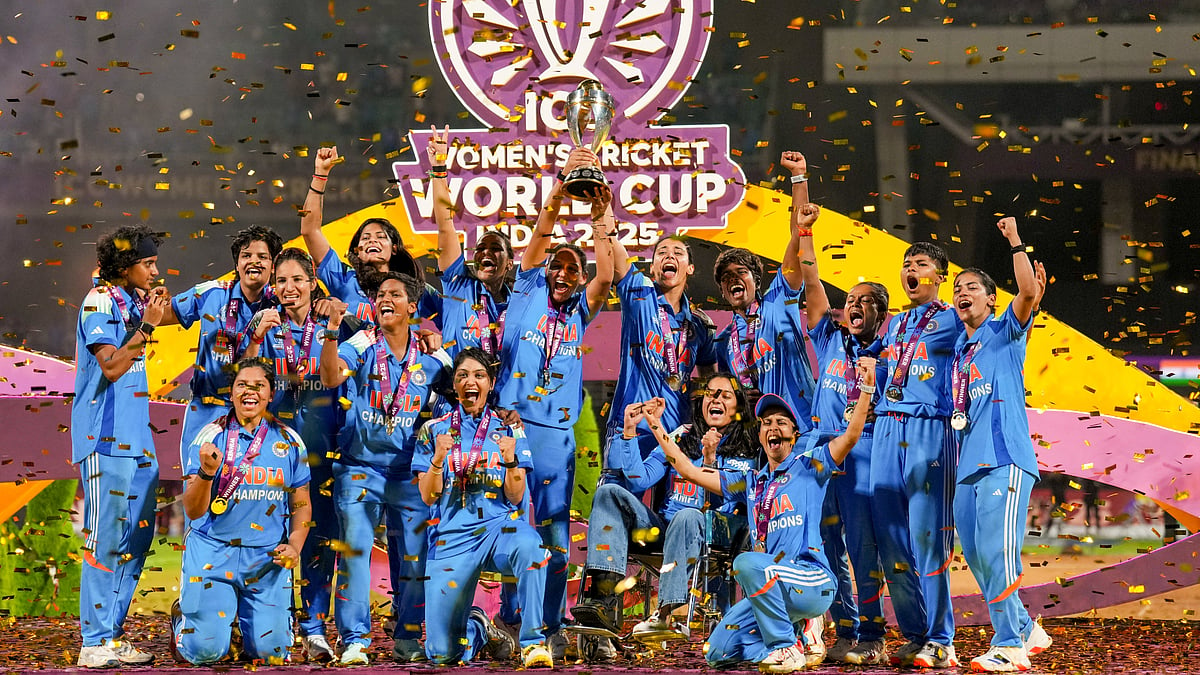Cricket
From heartbreak to history: Harmanpreet’s India paint the sky gold
With their breakthrough in the 13th edition, India join Australia, England and New Zealand in the pantheon of champions

On a night when destiny finally decided to smile, Indian women’s cricket completed the most glorious chapter of its story — a journey from heartbreaks to history. Under the incandescent leadership of Harmanpreet Kaur, a team forged in grit and grace outlasted South Africa by 52 runs in a spellbinding final to lift India’s first-ever ICC Women’s World Cup crown.
For a nation that had twice come agonisingly close — in 2005 and again in 2017 — this was not just a victory. It was deliverance. A culmination of dreams deferred, of years spent on dusty fields and in quiet determination, now reborn in a flood of tears, cheers, and the Tricolour confetti under the Navi Mumbai night.
With this breakthrough in the 13th edition of the global showpiece, India joined the pantheon of champions — Australia, England, and New Zealand — as the newest sovereign of the women’s game.
If this was a collective triumph, its brilliance was illuminated by two stars — Deepti Sharma and Shafali Verma — their journeys as contrasting as they were inspiring.
Published: undefined
Deepti, the quiet craftsman and eternal workhorse, once again stood tall when the stage burned brightest. Her masterful 5 for 39 and a composed 55 anchored India’s innings and dismantled South Africa’s chase. Finishing as the tournament’s highest wicket-taker (21), she spun her name into cricketing folklore.
Shafali, the firebrand reborn, was a story of redemption. Barely weeks ago, she had been confined to the domestic circuit, a spectator to the grand narrative. But fate, ever mischievous, opened a door when Pratika Rawal’s injury summoned her back. And the 21-year-old dynamo seized the moment — a dazzling 87 off 84 balls, followed by two crucial wickets — to script her own fairytale.
Her audacious strokeplay, paired with Smriti Mandhana’s elegant 45, powered India to 298 for 7, the second-highest total in World Cup history. Their 104-run opening stand blunted the Proteas attack, setting a rhythm India never lost.
Mandhana’s dismissal denied her another milestone, yet her campaign — 434 runs at 54.25, the most ever by an Indian in a Women’s World Cup — etched her as the tournament’s heartbeat.
When South Africa began their chase, there was a flicker of defiance. Laura Wolvaardt, regal in poise and purpose, crafted a majestic 101 off 98 balls, carrying her side’s fragile hopes.
But India’s bowlers hunted in a pack. Amanjot Kaur’s direct hit ignited belief, Shree Charani’s discipline choked runs, and Shafali’s double strike broke the backbone of the middle order.
Published: undefined
Just as Wolvaardt threatened to script a twist, Deepti rose again — removing her and Chloe Tryon in the space of four deliveries — and with it, the Proteas’ resistance crumbled. Her final wicket, Nadine de Klerk, sealed the night. The roar that followed wasn’t just of victory; it was of release — two decades of yearning exhaled in unison.
As the fireworks kissed the sky above DY Patil Stadium, Harmanpreet Kaur stood in the golden glow, trophy aloft, her eyes glistening. Around her, the tears of her teammates mingled with those of an entire generation — one that had watched Mithali Raj and Jhulan Goswami fall heartbreakingly short, but never lose faith.
This was their legacy fulfilled, carried forward by a new generation — Mandhana, Jemimah, Richa, and Shafali — who believed that women’s cricket in India no longer had to live in the shadows of its male counterpart.
From the stands, Rohit Sharma, still scarred by the heartbreak of 19 November 2023, watched with a silent prayer — that Harmanpreet would be spared the anguish he once knew. His prayer was answered.
For Amol Muzumdar, the head coach who never wore the India whites his talent once promised, the moment was redemptive — the World Cup his poetic closure.
And as Harmanpreet clasped Nadine de Klerk’s catch, backpedaling with poise and purpose, Ian Bishop’s voice echoed through the commentary box: “This moment will inspire generations.”
Indeed, it will.
2 November 2025 — a date now etched in gold beside 25 June 1983 — when Indian cricket once again found its Everest. Only this time, it was climbed by women who refused to look down.
With PTI inputs
Published: undefined
Follow us on: Facebook, Twitter, Google News, Instagram
Join our official telegram channel (@nationalherald) and stay updated with the latest headlines
Published: undefined